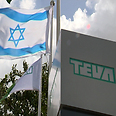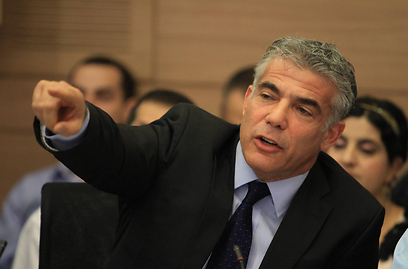
Teva's tax breaks worth NIS 12B in 6 years
List unveiled by Tax Authority shows drug maker leads companies that received tax benefits from State between 2006-2011. Finance Minister Lapid to reexamine benefits
The Tax Authority on Tuesday released a list of companies that had received tax breaks from the State, showing that Teva takes the lead with some NIS 12 billion (about $3.34 billion) in breaks between the years 2006-2011.
Other companies that received substantial tax benefits were Israel Chemical Ltd. (ICL) at NIS 2.23 billion ($620 million) over the same years, and Check Point Software Technologies at NIS 1.65 billion ($460 million) within that period.
It should be noted that starting this year, ICL will no longer be eligible for tax benefits from the State, due to changes added in 2009 to the Law for the Encouragement of Capital Investments, according to which companies that profit from natural resources will no longer be eligible for tax benefits.
Finance Minister Yair Lapid announced he would reevaluate the conditions for tax breaks, “with the goal of updating and fitting them to the current financial reality.”
Other companies that were awarded substantial tax breaks during the time period in question included hi-tech’s Nice Systems Ltd., which in the years 2006-2007 was given benefits totaling NIS 134.6 million ($37 million), and Elbit Systems, which between 2006-2007 and 2009-2010 received breaks of NIS 404.8 million ($113 million).
During 2010-2011, State company Rafael Advanced Defense Systems Ltd., was among the ten companies that received the most tax benefits from the State. Rafael received NIS 144.8 million ($40 million).
It should be noted that the goal of the law to is to encourage capital investment, through which these benefits were granted, is meant to provide a legal framework through which the State can encourage investment in jobs creation in Israel. It is unclear why the government provided such benefits to Rafael, which is wholly owned by the government.

Rafael (Photo: Doron Golan)
This information was revealed Tuesday following a petition filed against the Finance Ministry, leading to the ruling of Judge Michal Agmon-Gonen, requiring that within a week, the Treasury post the list of companies that receive tax breaks under the Encouragement of Capital Investments Law.
Also, the judge ruled that the Treasury must publish the names of the ten companies that received the highest benefits in 2006-2011, as well as the level of benefits received by each company. Note that the level of the benefit is derived not only from the scope of the tax breaks, but also from the degree of profitability of the company.

Lapid at Finance Committee meeting (Photo: Gil Yohanan)
Following an appeal filed by the Treasury, the Supreme Court ruled that it should only publish the names of State-owned companies, or companies listed on the stock exchange (public companies), and to avoid publicizing the names of privately held companies, out of fear that publicity could compromise their revenues and infringe on their rights to privacy of sensitive business information.
On Monday, a stormy session of the Finance Committee was held to discuss the issue of cutting tax benefits to companies that currently qualify for such under the investments law.
A vote on the issue will be held Wednesday. Lapid also said he would reconsider such benefits.
Teva: Law good for periphery
Teva said in response, "Teva is a public company that advocates transparency and has paid and continues to pay its taxes according to law. Since the enactment of the Law for the Encouragement of Capital Investments, Teva implements the purpose of the law and its spirit. The law helped Teva dramatically expand its investments in Israel, greatly contributed to strengthening the competitiveness of Israel in the global market, and strengthened the periphery against the center of the country.
"In the last decade, Teva has doubled the number of directly employed workers in Israel to 7,100 at sites and factories in many areas, including developing and peripheral areas… In addition, Teva employs 3,000 contract workers and has associated contracts with 7,000 suppliers, which employ another 40,000 workers."
Zvi Lavi contributed to this report










